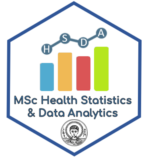Course details
| Faculty | Health Sciences | ||
| Department | Medicine | ||
| Education level | Postgraduate / Master of Science | ||
| Course code | B3 | Semester | 2 |
| Course title | Special Topics in Data Analytics I | ||
| Independent teaching activities | Hours per week | ECTS | |
| Lectures | 2 | ||
| Practice | 6 | ||
| Total | 8 | 7,5 | |
| Coursetype | General setting course, skills development | ||
| Prerequisite courses | None | ||
| Teaching and assessment language | English |
Learning outcomes
Objective
Upon completion of the course, students will know the basic principles of environmental epidemiology, and will be able to apply the appropriate methodology for the analysis of environmental data.
Knowledge
Upon completion of the course, graduate students will be familiar with:
- The basic principles of environmental epidemiology
- The specific content and analytical needs of research on the effects of macro-environmental factors on health.
- The basic concepts around data analysis in environmental epidemiology using Geographic Information Systems (GIS)
- The application of Poisson models for the analysis of epidemiological time series with application in environmental epidemiology
- Time-series analysis in the statistical package R
Capacities
The course participants upon completion will be able to:
- Know how research is planned and conducted on the health effects of environmental factors (such as exposure to air pollution, noise or climate change parameteres) and evaluate the related population attributable burden
- Assess related literature and recognize emerging issues in the research community and among environmental policy makers.
- Collect, process, analyze and display geospatial data and use them in exposure assessment or epidemiological statistical models.
- Apply Poisson models for the analysis of epidemiological time series using a variety of approaches to control for possible confounding factors.
Course contents
During the course, students will work on their own research question, and will experience the process of review at all stages. So they will learn how to:
- Introduction to environmental epidemiology and related study designs
- Introduction to time-series analysis in environmental epidemiology
- Poisson epidemiological models and methods (parametric and non-parametric) to adjust for potential confounders
- Model selection criteria
- Approaches for modeling time-lag structures
- Methods for investigating exposure response relationships
- Special issues in Environmental epidemiology.
| Teaching methods | Face to face Distance learning | |
| Use of information and communication technologies (ICT) | Use of ICT in Teaching- Moodle Virtual learning environment (VLE) (asynchronous learning, wikis, Online Discussion Fora, Educational Portfolio, assignment submission, assessment process) | |
| Use of ICT in Communication with students (email, instant messaging via Moodle) | ||
| Module structure | Work Hours per Semester | Activity |
| Lectures | 55 | |
| Exercises (Quiz) | 10 | |
| Exercises (Wikis) | 10 | |
| Exercises (Online discussion fora) | 20 | |
| Exercises (Study relevant papers) | 20 | |
| Essay background work | 40 | |
| Essay writing | 45 | |
| Overall work for the course | 200 | |
| Assessment Methods | Written assignment, in English, approximately 2,500 words long, to be submitted by each student at the end of the course | |
| Assessment of knowledge at the beginning and the end of the course with short-answer questions and essays development | ||
| Weekly quizes, with multiple choice questions | ||
| Assessment based on comments submitted by each student in online discussion fora |
Recommended bibliography
- Peng Roger D, Dominici Francesca. Statistical Methods for Environmental Epidemiology with R. A Case Study in Air Pollution and Health. 2008. Springer Ed.
- Duncan C. Thomas. Statistical Methods in Environmental Epidemiology. Oxford University Press, 2009
